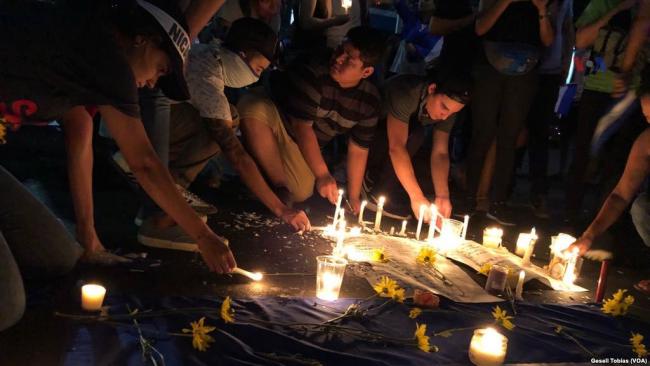by LAURA BLUME
 Demonstrators in Managua, Nicaragua mourn the deaths of victims killed during protests earlier this year PHOTO/Gessel Tobías
Demonstrators in Managua, Nicaragua mourn the deaths of victims killed during protests earlier this year PHOTO/Gessel Tobías
U.S. responses to Nicaragua’s Daniel Ortega and Honduras’ Juan Orlando Hernández reveal Washington’s foreign policy in Central America is stuck in the Cold War era.
Following the news in Nicaragua since April 19 has been a constant source of inspiration, anxiety, and anguish. A few weeks ago, when a friend in Nicaragua forwarded me a news article, I opened it with trepidation and prepared myself for more heartbreak. But there was no way I could have prepared myself to see a friend’s face staring back at me under a headline declaring that he and eight other young protesters had been accused of terrorism.
As I started to worry about the fear and possibly even torture my friend was facing, I recalled another recent episode of protests. Last year, on December 17, I received a late night message from another friend, who I will call Javier to protect his identity: “Laura, if I don’t return tell [my girlfriend] that I love her. I’m going out to defend my pueblo.” But Javier wasn’t talking about Nicaragua, and he was not expressing fear of violence at the hands of President Daniel Ortega’s police or pro-government paramilitaries. Instead, he was referring to the streets of Honduras, and the Honduran military, which receives extensive funding and training from the United States.
As Amnesty International notes, Honduras and Nicaragua both exemplify a recent regional trend of suppressing the right to protest and using excessive force against demonstrators. What sets the two situations apart, however, is the U.S. hypocrisy of continuing to support Honduran President Juan Orlando Hernández while decrying the human rights violations in neighboring Nicaragua.
In Honduras, the military cracked down on demonstrators who participated in widespread protests against the highly suspect victory of President Juan Orlando Hernández (JOH) after the November 26, 2017 election. The night election authorities finally announced JOH as the winner three weeks after election day—my friend Javier had told me that those who violated the state-imposed curfew and continued to protest were doing so at their own risk and would not be afforded constitutional protections. Javier said that the state forces cracking down on the protesters saw them as worthless (“vales verga”) and were willing to beat or even kill peaceful protestors.
In Nicaragua, the government has instituted a range of new, repressive measures in response to the ongoing protests sparked initially by pension reform. As calls for the resignation of Ortega and his wife and Vice President Rosario Murillo have mounted, so has the violent backlash by both state forces and government-backed paramilitary groups. The duo’s latest attempt to quash dissent came in the form of a new anti-terrorism law. Passed on July 16, Ley 977 states that those found guilty of terrorism— or anyone who provides any kind of material or financial assistance to alleged “terrorist” groups—could face up to 20 years in prison.
